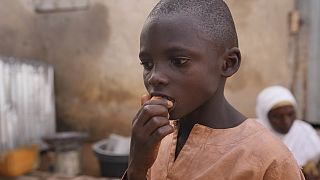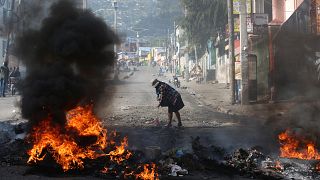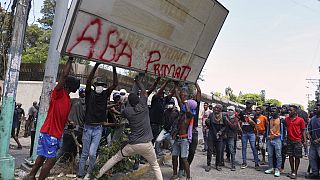Haiti
Some 6,000 people in Haiti are starving, with nearly half the population experiencing crisis levels of hunger as gang violence smothers life in the capital of Port-au-Prince and beyond, according to a new report released Monday.
The family of Jean Yonel and Hyacinthe Monime, along with their seven children, barely have enough for one meal a day, which usually consists of just rice or pasta.
Yonel fled his home with his family after gangs raided their neighborhood.
"The food that would normally feed only one person has to feed ten people. We only get enough nourishment for us not to die," said Yonel.
Yonel used to work as a mason, but with construction jobs drying up, he is now forced to search for wood to make charcoal. His wife sells second-hand clothes.
On days when they can’t afford a proper meal for their children, she mixes flour with spinach to keep their stomachs from rumbling.
Despite the arrival of almost 500 policemen in Haiti over the last few months to reinforce the national police and combat the gangs, most of the country's capital remains unsafe.
The streets are littered with trash, and barricades with burned-down vehicles, remnants of the latest gang activity.
From April to June, at least 1,379 people were reported killed or injured, and another 428 kidnapped. In addition, gang violence has left more than 700,000 people homeless in recent years.
According to the report IPC (Integrated Food Security Phase Classification) released Monday, Haiti is facing the highest levels of food insecurity on record.
After years of deterioration, 5.4 million people (48% of the analyzed population) are in urgent need of assistance, of which 2 million are in emergency conditions representing a 42% increase since last year’s analysis (August 2023), an additional 600,000 people, said the report.
While much of the hunger is directly tied to gang violence, double-digit inflation also has limited what many Haitians can afford to buy, with food now representing 70% of total household expenditures.
The cost of a food basket increased more than 11% in the past year, with inflation hitting 30% in July.
The few shelters in the city are overcrowded with families that were forced to leave their homes in areas where there was heavy gunfire as gangs fought for territory.
The 6,000 internally displaced people in the shelters are entirely reliant on food donated by the World Food Programme and other NGOs and are facing a catastrophic level of food insecurity (IPC phase 5). This is the first occurrence since September 2022 and only the second time in the region's history.
“So, we see very many people who are living in sites for displaced people within the capital who are in a situation which is considered to be the most severe situation in terms of food insecurity,” said Tanya Birkbeck, WFP Haiti Spokesperson.
The report informed that humanitarian food agencies and NGOs in Haiti are short of US$ 230 million to implement programs until the end of the year – while families displaced by this year’s surge in violence are on the frontline of rising hunger.
According to the report, the latest data shows that the number of people facing acute hunger has now reached half of Haiti’s population, with the highest rate ever recorded of emergency levels of hunger in Haiti.











Go to video
World Food Programme to halt aid for 650,000 women and children in Ethiopia
Go to video
Protesters in Haiti demand protection against gangs
02:05
Human Rights Watch urges action over incendiary weapons use in South Sudan
Go to video
Sudan: World Food Programme warns of hunger crisis, asks for more funding
Go to video
At least 50 dead in violent attacks in eastern DRC
Go to video
At least 14 million children worldwide risk malnutrition, warns UNICEF